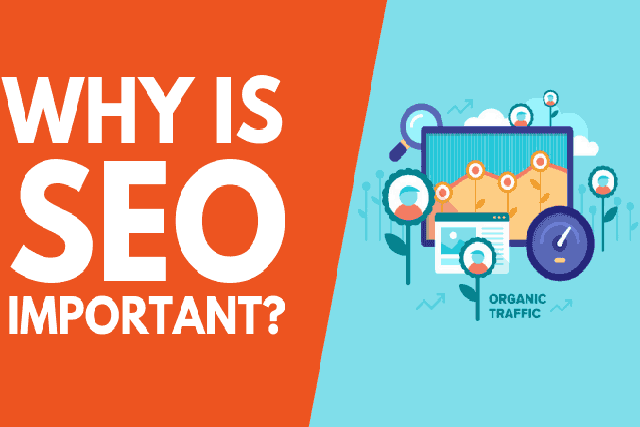Why SEO is important for business
Understanding the various components that makeup SEO and how they interact is essential to comprehending why SEO is so significant. In other words, SEO is essential because it increases the visibility of your website, which results in increased traffic and the opportunity to convert visitors into paying clients.
What Is SEO & Why Is It Important?
What is SEO?
Search engine optimization is known as SEO. It is a collection of guidelines for website optimization that can help your website rank higher in organic search results. It is the procedure to adhere to in order to improve your website’s visibility in search engines and increase traffic.
Two main objectives of SEO. The first is to aid in your comprehension of internet user searches so you can provide high-quality content to meet their needs. The second is to assist you in building a website whose contents search engines can find, index, and comprehend.
Additionally, by making a website more user-friendly, quick, and simple to navigate, adhering to excellent SEO principles is a terrific approach to raise the quality of a website.
The most crucial SEO duties revolve around:
determining the user searches that are relevant to your goods and services
generating content that will satisfy users
Through numerous SEO tactics, the proper signals are sent to search engine crawlers and algorithms.
Since the entire process comprises a number of rules (or standards), a number of stages, and a set of controls, SEO may be thought of as a comprehensive framework.
Why is SEO important?
More than 70% of search engine users are more likely to click on one of the top 5 suggestions on the search engine results pages (SERPS) (see graph below). Your website must show up in one of the top positions in order to benefit from this and attract people to your website or clients to your online store.
Good SEO techniques also enhance a website’s usability and user experience, thus SEO is not just about search engines.
Users trust search engines, therefore having a website appear in the top results for the user’s search terms builds user trust.
The social media promotion of your website benefits from SEO.
A large website needs SEO to function properly. Both directly and indirectly, SEO can help websites with several authors. An increase in organic traffic is their direct gain, and having a standard framework (checklists) to use before posting content on the site is their indirect gain.
You may outperform the competition by using SEO. The website with search engine optimization is more likely to have more visitors and close more purchases if two websites are both selling the same product.
Increased Visibility: SEO helps your website rank higher in search engine results pages (SERPs). When your website appears at the top of the search results for relevant keywords, it becomes more visible to potential customers, increasing the likelihood of attracting organic traffic.
More Organic Traffic: Ranking well in search results drives organic traffic to your website. This traffic is often more qualified because it comes from users actively searching for products, services, or information related to your business.
Cost-Effective Marketing: SEO is a cost-effective marketing strategy in the long run. While there are initial setup and ongoing optimization costs, it often provides a higher return on investment (ROI) compared to paid advertising.
Brand Credibility and Trust: Websites that rank highly in search results are often perceived as more trustworthy and credible by users. A strong online presence through SEO can bolster your brand’s reputation.
Competitive Advantage: Your competitors are likely investing in SEO. By optimizing your website and content, you can gain a competitive advantage and capture market share.
Local Search and Foot Traffic: Local SEO is essential for brick-and-mortar businesses. It helps you appear in local search results, increasing the chances of attracting nearby customers and foot traffic.
Targeted Traffic: SEO allows you to target specific keywords and demographics, ensuring that your website is visible to the right audience. This increases the likelihood of attracting qualified leads and potential customers.
User Experience (UX): SEO is not just about keywords; it also involves optimizing the user experience. A well-structured website that loads quickly, is mobile-responsive, and provides valuable content enhances user satisfaction and can lead to higher conversion rates.
Content Marketing Integration: SEO and content marketing go hand in hand. High-quality, optimized content can attract, engage, and convert visitors into customers. Effective content marketing can help you establish thought leadership in your industry.
Measurable Results: SEO provides valuable data and insights. You can track your website’s performance, analyze user behavior, and measure the effectiveness of your strategies through tools like Google Analytics.
Adaptation to Changing Trends: SEO strategies must evolve with search engine algorithms and user behavior. Staying updated with SEO best practices ensures your business remains adaptable and relevant in a dynamic online environment.
Global Reach: SEO can help your business reach a global audience. By targeting keywords and optimizing content for various regions and languages, you can expand your market reach.
Lead Generation: SEO can be a powerful lead generation tool. When users find your website in search results and engage with your content, they are more likely to become leads and potential customers.
User Behavior Insights: SEO tools can provide insights into user behavior and preferences. This information can guide your business development strategies and help you tailor your offerings to meet customer needs.
Long-Term Results: Unlike some short-term marketing strategies, the benefits of SEO can be long-lasting. By consistently investing in SEO, your business can maintain a strong online presence and continue to attract traffic and customers over time.
In summary, SEO is an essential component of business development in the digital age. It enhances visibility, credibility, and user experience while providing a cost-effective and measurable way to attract qualified leads and customers. A well-executed SEO strategy is an investment in the long-term growth and success of your business.

0 comments on “Why SEO is important for business”